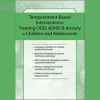-
×
 Rewire the Anxious Brain: Neuroscience-Informed Treatment of Anxiety, Panic and Worry By Marwa Azab - PESI
1 × $23.10
Rewire the Anxious Brain: Neuroscience-Informed Treatment of Anxiety, Panic and Worry By Marwa Azab - PESI
1 × $23.10 -
×
 Barb Stepp’s NLP Master Practitioner By Barbara Stepp
1 × $23.10
Barb Stepp’s NLP Master Practitioner By Barbara Stepp
1 × $23.10 -
×
 Self-Regulation & Executive Functioning in Children and Adolescents: Visual Strategies and Hands-on Techniques to Provide Structure, Predictability, and Routines By Kathy Morris
1 × $23.10
Self-Regulation & Executive Functioning in Children and Adolescents: Visual Strategies and Hands-on Techniques to Provide Structure, Predictability, and Routines By Kathy Morris
1 × $23.10 -
×
 Ultimate Guide Technical Trading
1 × $23.10
Ultimate Guide Technical Trading
1 × $23.10 -
×
 Utah Legal and Ethical Issues for Mental Health Clinicians By Susan Lewis - PESI
1 × $23.10
Utah Legal and Ethical Issues for Mental Health Clinicians By Susan Lewis - PESI
1 × $23.10 -
×
 PTSD in Veterans: Impact of PTSD on Military Personnel and War Veterans and Their Families By Michael Gatson - PESI
1 × $23.10
PTSD in Veterans: Impact of PTSD on Military Personnel and War Veterans and Their Families By Michael Gatson - PESI
1 × $23.10 -
×
 Carl Bretzke Bundle
1 × $46.00
Carl Bretzke Bundle
1 × $46.00 -
×
 Science of Stretching Program By Yogabody
1 × $23.10
Science of Stretching Program By Yogabody
1 × $23.10 -
×
 The Complete Crowdfunding PR System By Salvador Briggman - CrowdCrux
1 × $23.10
The Complete Crowdfunding PR System By Salvador Briggman - CrowdCrux
1 × $23.10 -
×
 Med-Surg Certification - CMSRN ® Exam Prep Course by Cyndi Zarbano
1 × $15.40
Med-Surg Certification - CMSRN ® Exam Prep Course by Cyndi Zarbano
1 × $15.40 -
×
 Forensic Nursing: The Harsh Realities in Every Patient Care Setting By Pamela Tabor - PESI
1 × $23.10
Forensic Nursing: The Harsh Realities in Every Patient Care Setting By Pamela Tabor - PESI
1 × $23.10 -
×
 Joint Venture Secrets by Jeff Paul & Dan Kennedy
1 × $15.40
Joint Venture Secrets by Jeff Paul & Dan Kennedy
1 × $15.40 -
×
 What to Do in the First 90 Days of Your New Job
1 × $23.10
What to Do in the First 90 Days of Your New Job
1 × $23.10 -
×
 Ethics & Cultural Competency: 1-Day Intensive Certificate By Frances Patterson - PESI
1 × $23.10
Ethics & Cultural Competency: 1-Day Intensive Certificate By Frances Patterson - PESI
1 × $23.10 -
×
 Trauma-Informed Yoga for Children and Adolescents: Mind-Body Sequencing for ADHD, Anxiety and Post-Traumatic Stress By Kathy Flaminio
1 × $23.10
Trauma-Informed Yoga for Children and Adolescents: Mind-Body Sequencing for ADHD, Anxiety and Post-Traumatic Stress By Kathy Flaminio
1 × $23.10 -
×
 Orchestral Music Mixing By Joël Dollié
1 × $23.10
Orchestral Music Mixing By Joël Dollié
1 × $23.10 -
×
 Perfect Weight Forever By Marisa Peer
1 × $23.10
Perfect Weight Forever By Marisa Peer
1 × $23.10 -
×
 The Marriage Reset: From Obligation To Adventure By Dani Johnson
1 × $31.00
The Marriage Reset: From Obligation To Adventure By Dani Johnson
1 × $31.00 -
×
 SEO Operating System By James Ewen
1 × $15.00
SEO Operating System By James Ewen
1 × $15.00 -
×
 Intermediate To Advanced Breath-Control Course By Simon Borg-Olivier
1 × $39.00
Intermediate To Advanced Breath-Control Course By Simon Borg-Olivier
1 × $39.00 -
×
 Legal and Ethical Issues in Behavioral Health in South Carolina By Lois Fenner - PESI
1 × $23.10
Legal and Ethical Issues in Behavioral Health in South Carolina By Lois Fenner - PESI
1 × $23.10 -
×
 Essential LUTs By EZCO
1 × $7.70
Essential LUTs By EZCO
1 × $7.70 -
×
 Writing Email Copy for B2B Companies By AWAI
1 × $23.10
Writing Email Copy for B2B Companies By AWAI
1 × $23.10 -
×
 Couples on the Brink: When Is Enough Enough? By Terry Real - PESI
1 × $23.10
Couples on the Brink: When Is Enough Enough? By Terry Real - PESI
1 × $23.10 -
×
 Acceptance and Commitment Therapy (ACT) Made Easy: Innovative Techniques for Depression, Anxiety, Trauma & Personality Disorders By Douglas Fogel - PESI
1 × $23.10
Acceptance and Commitment Therapy (ACT) Made Easy: Innovative Techniques for Depression, Anxiety, Trauma & Personality Disorders By Douglas Fogel - PESI
1 × $23.10 -
×
 Daily Price Action
1 × $23.10
Daily Price Action
1 × $23.10
Temperament-Based Interventions: Treating ODD, ADHD & Anxiety in Children and Adolescents By Patricia McGuire – PESI
$249.00 Original price was: $249.00.$23.10Current price is: $23.10.
SKU: C55vip.11319QxmHTV6D
Category: Download
Tags: ADHD & Anxiety in Children and Adolescents, Patricia McGuire - PESI, Temperament-Based Interventions, Treating ODD
Temperament-based interventions: Treating ODD, ADHD, and anxiety in children and adolescents – Digital Download!

Temperament-Based Interventions: Treating ODD, ADHD & Anxiety in Children and Adolescents By Patricia McGuire – PESI
Overview

Temperament-Based Interventions: Addressing ODD, ADHD, and Anxiety in Youth
When tackling mental health concerns such as Oppositional Defiant Disorder (ODD), Attention Deficit Hyperactivity Disorder (ADHD), and anxiety in children and adolescents, a universal approach is rarely effective. Successful treatment often depends on recognizing and working with a child’s unique temperament. Temperament-based interventions harness the intrinsic traits of a child’s personality to create customized therapeutic approaches, enhancing engagement and fostering positive behavioral changes. By acknowledging that every child experiences the world differently, clinicians can implement interventions tailored to each child’s specific needs. This article explores the fundamental aspects of temperament-based treatment, its advantages, supporting research, and the significance of parental guidance in these therapeutic strategies.
Fundamental Aspects of Temperament-Based Treatment
Temperament is more than just a psychological concept—it represents fundamental characteristics that shape a child’s personality. These traits influence various aspects of behavior, including activity levels, emotional intensity, adaptability, and mood stability. The foundation of temperament-based interventions begins with an in-depth understanding of these traits:
-
Recognizing a Child’s Temperament: A thorough assessment helps clinicians identify how a child’s inherent characteristics impact behavior, emotions, and social interactions. For example, children with heightened emotional sensitivity may react intensely to everyday situations, whereas those with lower activity levels may appear less engaged.
-
Tailored Therapy Techniques: The core of temperament-based treatment lies in its individualized approach. For example, a child with high emotional reactivity might benefit from therapy focused on emotional regulation and coping skills, while a child with low activity levels may respond better to dynamic, interactive therapy techniques, such as engaging physical activities that boost participation.
-
Guidance for Parents: Parents play a pivotal role in implementing temperament-based approaches effectively. They receive specialized training to better understand their child’s temperament, allowing them to create a more supportive home environment tailored to their child’s unique personality.
-
Behavioral and Cognitive Techniques: Many temperament-based interventions integrate cognitive-behavioral strategies to manage symptoms of ADHD and anxiety. Children learn to recognize behavioral triggers and develop self-regulation skills, such as deep breathing exercises and positive self-talk, to navigate emotional challenges.
-
Encouraging Positive Behaviors: A crucial aspect of these interventions involves rewarding desired behaviors while maintaining consistent responses to negative ones. This structured reinforcement helps children develop adaptive emotional and behavioral patterns over time.
Summary of Key Elements
| Component | Description |
|---|---|
| Recognizing a Child’s Temperament | Assessing a child’s inherent traits and their influence on emotions and behavior. |
| Tailored Therapy Techniques | Customizing interventions to match temperament traits (e.g., emotional regulation techniques). |
| Guidance for Parents | Training parents to create home environments suited to their child’s temperament. |
| Behavioral and Cognitive Techniques | Teaching self-regulation skills like deep breathing and positive thinking. |
| Encouraging Positive Behaviors | Reinforcing adaptive behaviors through rewards and consistent responses. |
Key Benefits of a Temperament-Focused Approach
Applying temperament-based strategies offers several key benefits, extending beyond symptom management to promote stronger family relationships and long-term emotional well-being:
-
Greater Engagement in Therapy: Children are more actively involved in treatment when the approach aligns with their temperament, making therapy more enjoyable and improving participation rates.
-
Stronger Behavioral Improvements: Research suggests that when interventions reflect a child’s innate traits, they can lead to notable reductions in ODD and ADHD symptoms, better emotional regulation, and improved anxiety management. Parents frequently report significant behavioral improvements after implementing temperament-based techniques.
-
Enhanced Parent-Child Connection: Educating parents on their child’s temperament fosters better communication and deeper empathy, leading to more harmonious family interactions.
-
Comprehensive and Holistic Treatment: Unlike traditional methods that focus solely on symptoms, temperament-based interventions address emotional, social, and behavioral factors, providing well-rounded therapeutic support.
Overview of Key Benefits
| Benefit | Explanation |
|---|---|
| Greater Engagement in Therapy | Enjoyable and relatable interventions boost participation. |
| Stronger Behavioral Improvements | Significant symptom reductions in ODD, ADHD, and anxiety. |
| Enhanced Parent-Child Connection | Improved communication and understanding within families. |
| Comprehensive and Holistic Treatment | Addresses emotional, social, and behavioral challenges together. |
Scientific Evidence Supporting Temperament-Based Methods
A growing body of research highlights the importance of temperament in understanding and treating behavioral disorders such as ODD, ADHD, and anxiety. Studies indicate that specific temperament traits can increase a child’s vulnerability to these conditions. For instance, children with high negative emotionality or low adaptability are more likely to struggle with behavioral challenges. Recognizing these tendencies allows clinicians to craft personalized interventions that cater to each child’s unique emotional and behavioral profile.
One significant study published in the Journal of Child Psychology and Psychiatry revealed that children with particular temperament traits responded more effectively to interventions tailored to their individual needs. These findings emphasize that customized therapeutic approaches not only increase engagement but also improve overall treatment success.
This research also sheds light on why conventional treatment models often fall short—they tend to overlook the individual differences in children’s emotional processing. By incorporating temperament into therapy, clinicians can create a nurturing environment that fosters both emotional and behavioral growth, ultimately leading to more positive long-term outcomes for children and their families.
Final Thoughts on Tailored Interventions for Children
In summary, temperament-based interventions provide an innovative and highly effective framework for addressing ODD, ADHD, and anxiety in children and adolescents. By centering therapeutic approaches on each child’s unique temperament, professionals can implement personalized strategies that enhance treatment engagement and effectiveness. Additionally, involving parents in the intervention process strengthens family relationships and fosters better communication.
As pediatric mental health care continues to evolve, this customized approach may represent the future of child and adolescent therapy. Ongoing research is vital to further refining temperament-based techniques, ensuring that children struggling with emotional and behavioral challenges receive the most effective and tailored support possible.
Frequently Asked Questions:
Business Model Innovation: We operate a group buying strategy, allowing participants to share costs and access popular courses at reduced prices. This model benefits individuals with limited financial resources, despite concerns from content creators about distribution methods.
Legal Considerations: The legality of our operations involves complex issues. Although we don’t have explicit permission from course creators to resell their content, there are no specific resale restrictions stated at the time of purchase. This ambiguity creates an opportunity for us to provide affordable educational resources.
Quality Control: We ensure that all course materials purchased are identical to those offered directly by the creators. However, it’s important to understand that we are not official providers. As such, our offerings do not include:
– Live coaching calls or sessions with the course author.
– Access to exclusive author-controlled groups or portals.
– Membership in private forums.
– Direct email support from the author or their team.
We aim to reduce the cost barrier in education by offering these courses independently, without the premium services available through official channels. We appreciate your understanding of our unique approach.
Be the first to review “Temperament-Based Interventions: Treating ODD, ADHD & Anxiety in Children and Adolescents By Patricia McGuire – PESI” Cancel reply
You must be logged in to post a review.









Reviews
There are no reviews yet.